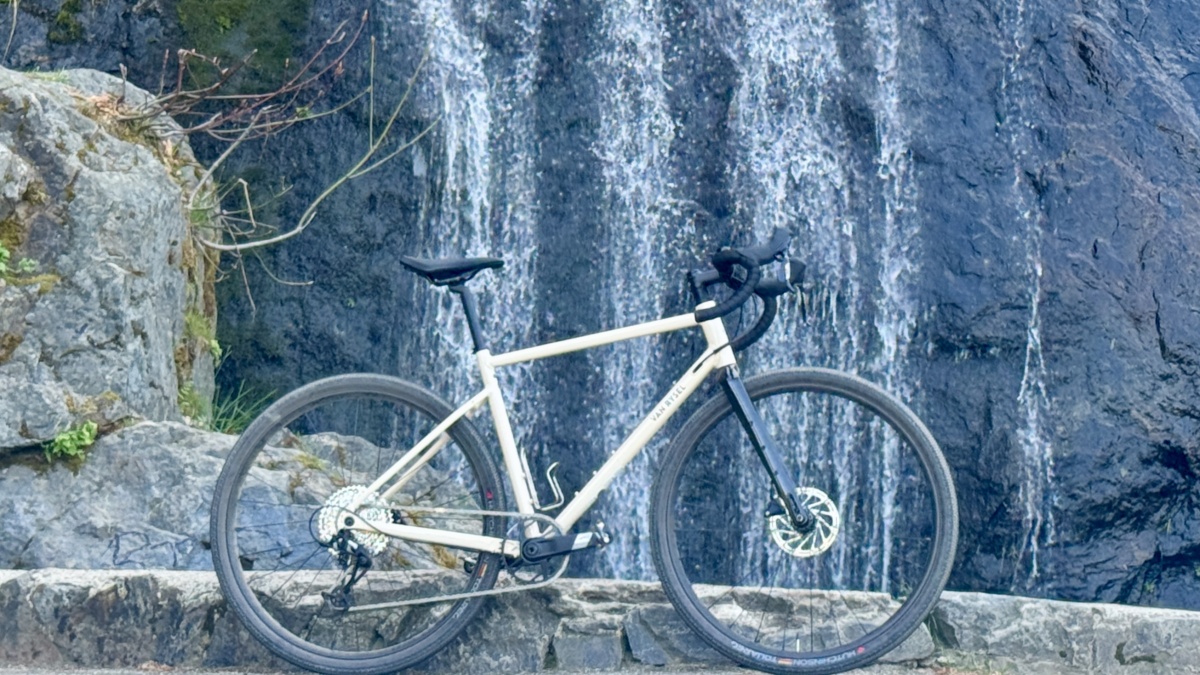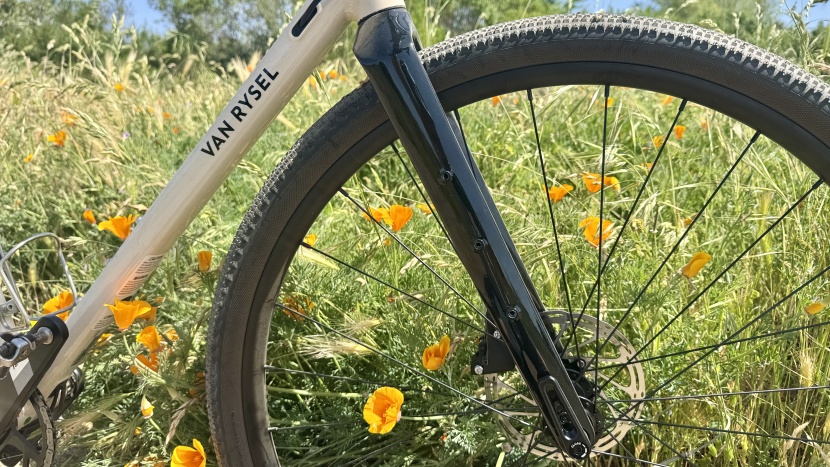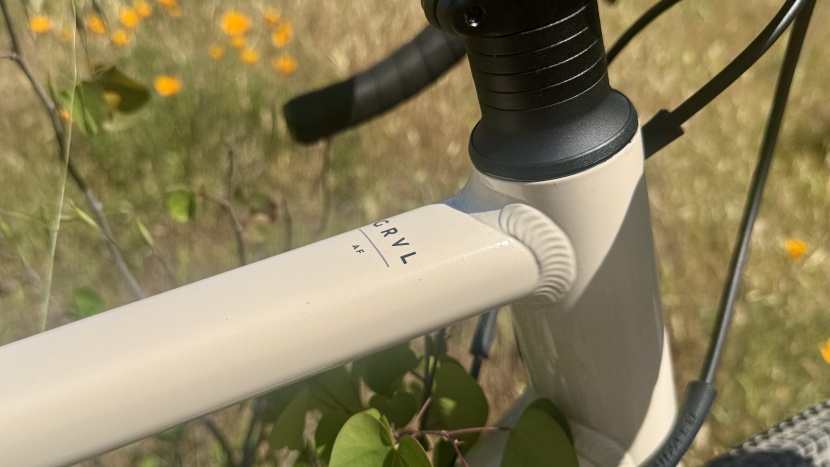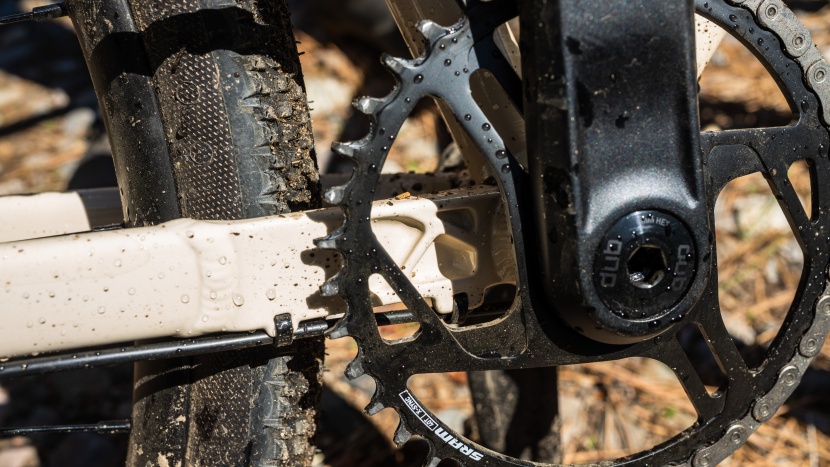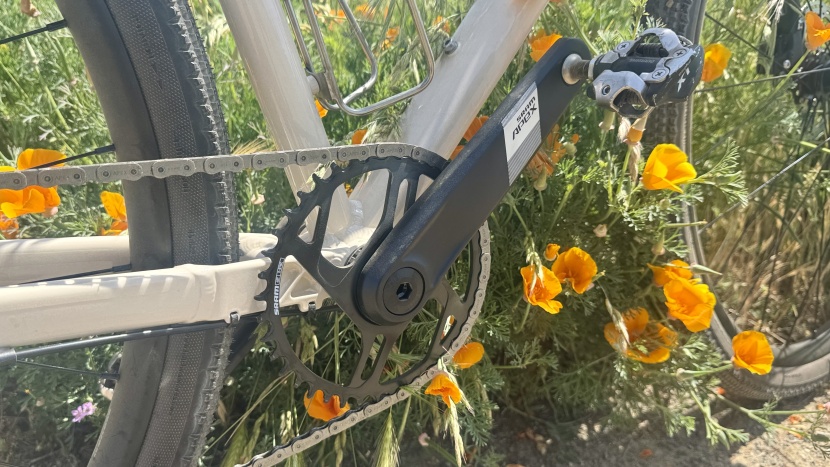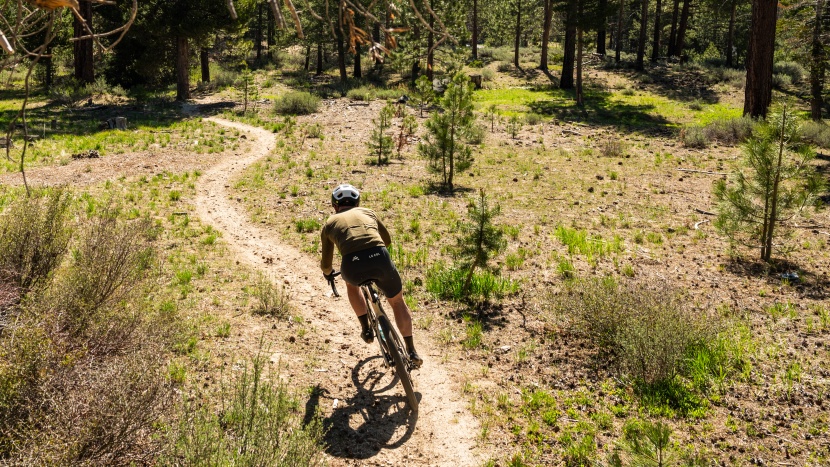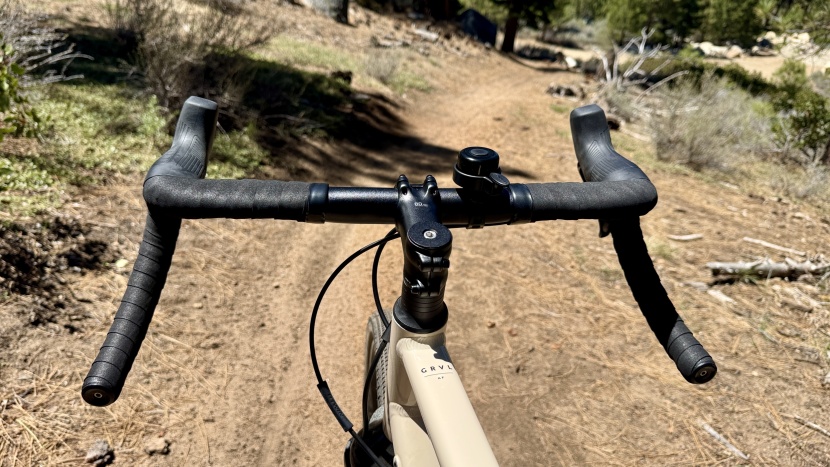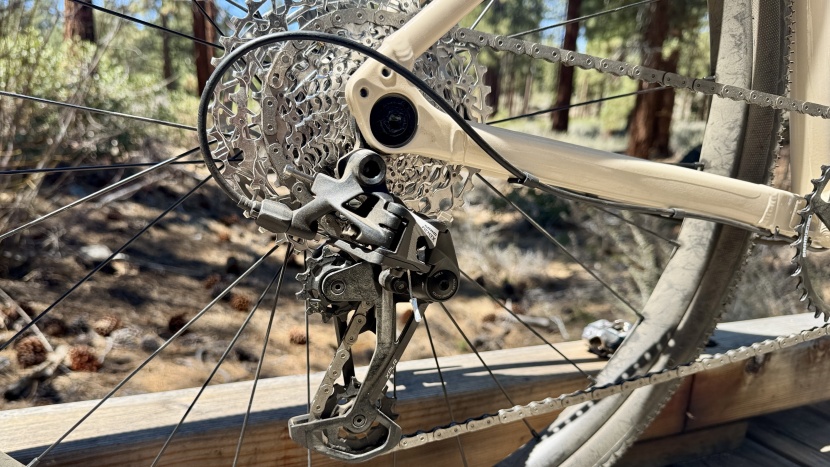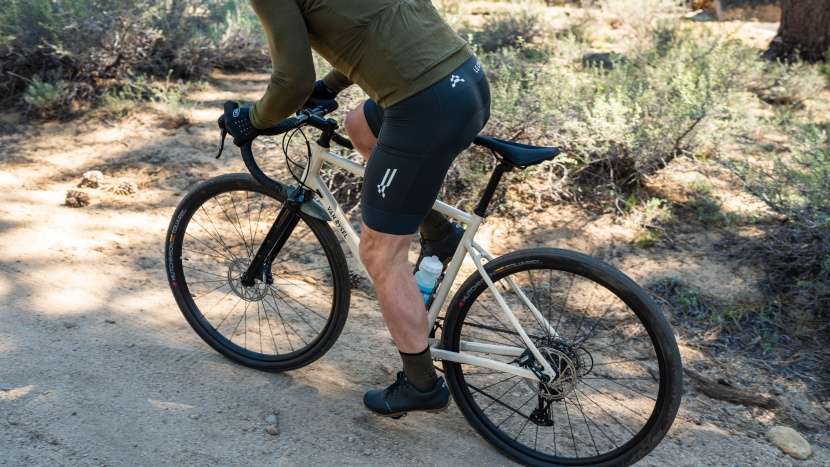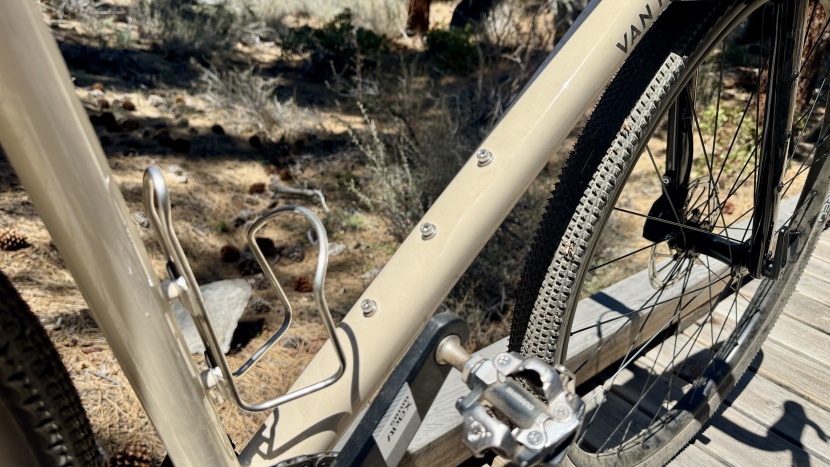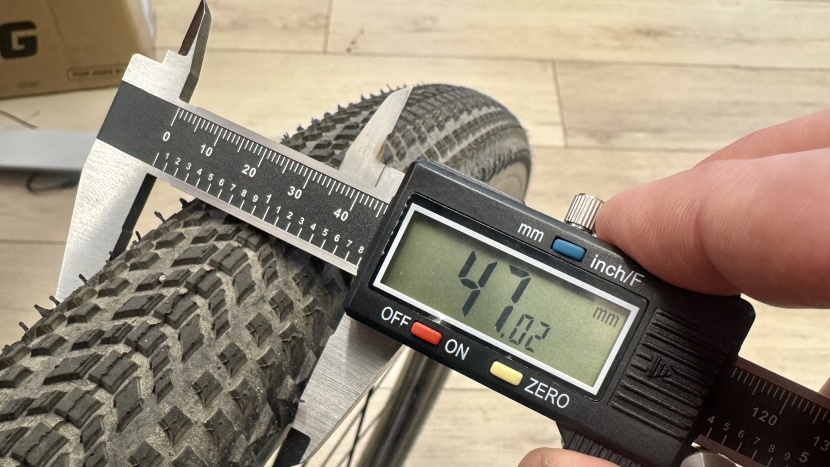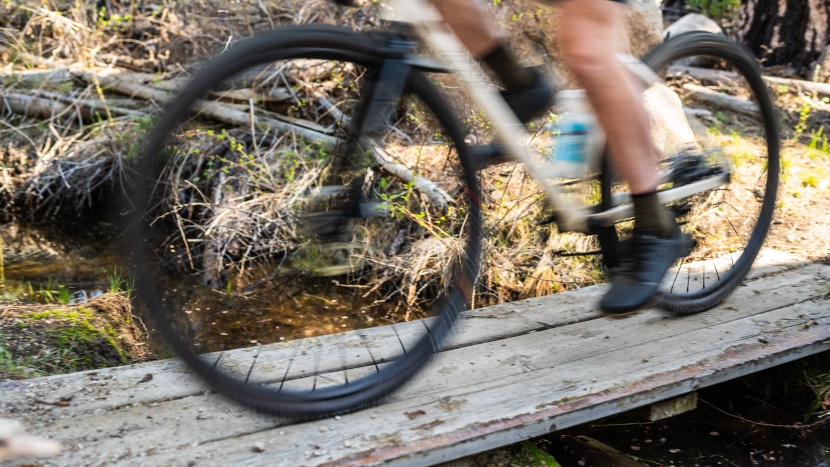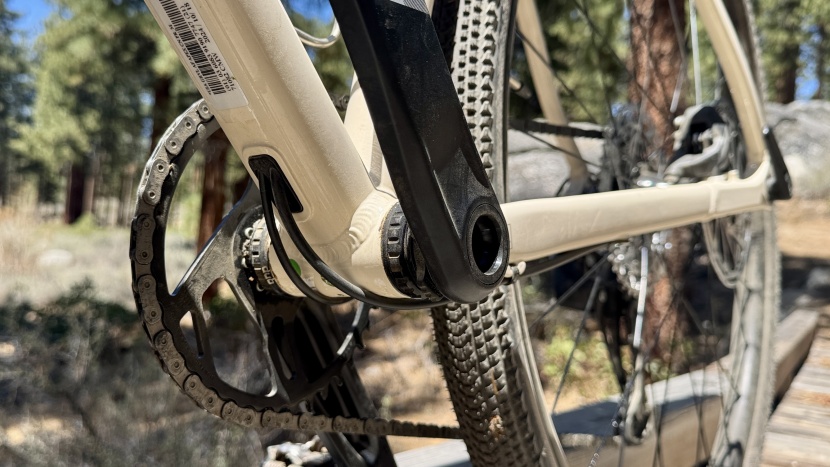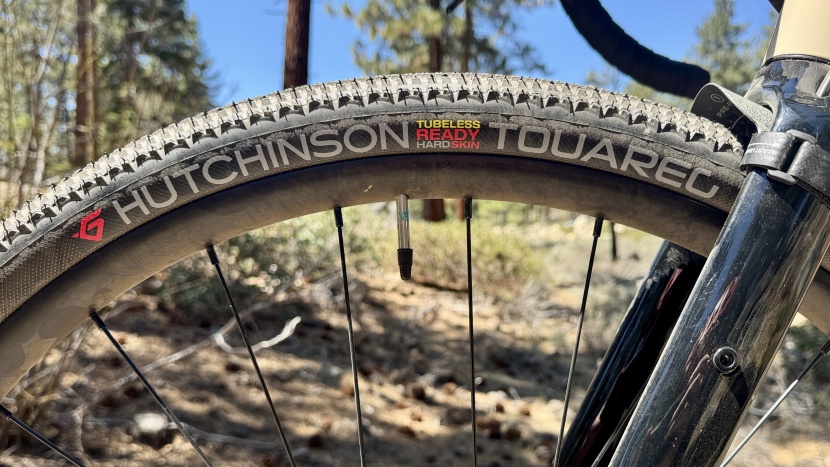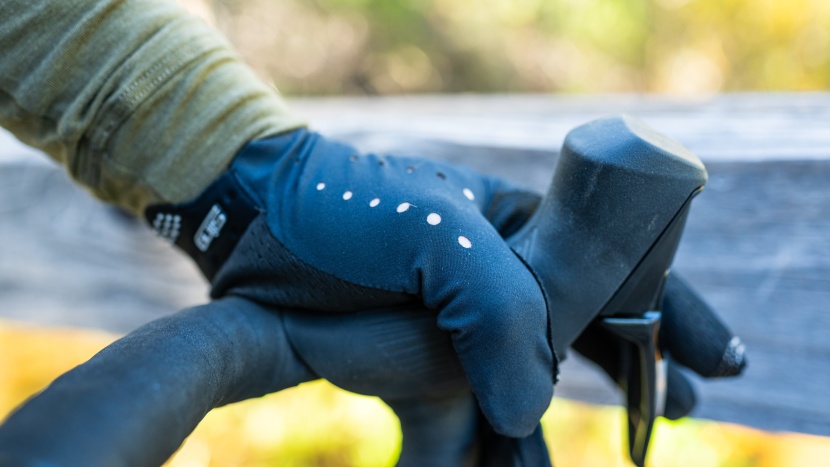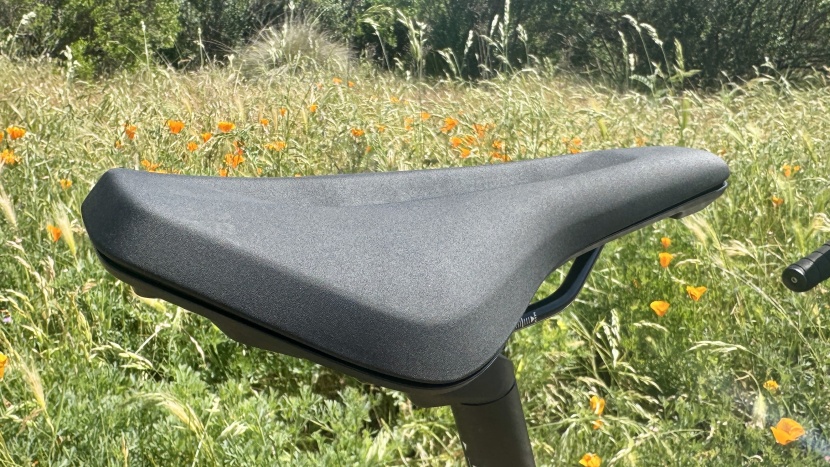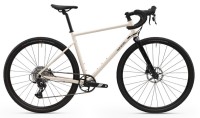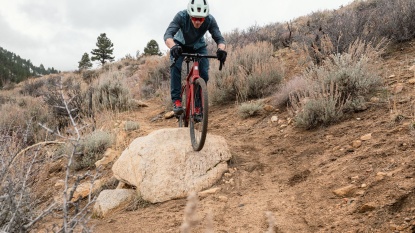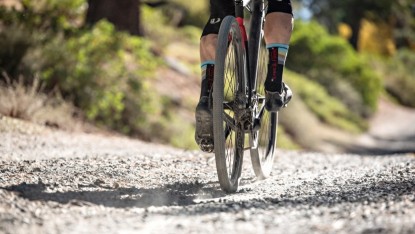
Our Verdict
Our Analysis and Test Results
This bike is GRVL AF, it says so on the top tube. The AF stands for Aluminum Frame, and while the material isn't generally as comfortable as steel or carbon, you might not notice with tires this large. Available with three different build kits, the APEX build tested here is the middle price point offering. Equipped with a carbon fork, a 1X drivetrain, and mounts for everything you could imagine adding, it's an excellent way to get into gravel biking.
Frame Design
Van Rysel built the GRVL AF out of 6061 double-butted aluminum tubing with mild geometry that will leave you feeling confident and in control. A 70-degree headtube angle keeps the steering slow and weighted; it never feels eager or unpredictably twitchy. The 73.5-degree seat tube angle isn't very progressive and lends itself to longer days in the saddle. You aren't directly over the saddle with quadricep power; instead, you're a bit further back, giving you some cockpit length and engaging your hamstrings. 435mm chainstays are relatively standard for a bike like this, as is the 1052mm wheelbase. These numbers give the bike stability at speed and when weighted, and while they might distract from its sportiness, it's not a racing bike. The bike has rack and fender mounts, a water bottle mount on the seat tube, and 3-pack mounts on the downtube and fork legs.
The carbon fork uses an alloy steerer tube, thru axle, and flat disc brake mount, letting it take advantage of all the modern technological innovations. Despite having chainstay and seatstay bridges, the frame has monstrous tire clearance with the 45mm tires barely filling the arches. A slightly sloping top tube gives you more standover clearance and a slightly longer seatpost. Our test bike came with an alloy post, but swapping to a carbon post on this frame would make a lot of sense. Cable routing is all internal, giving the frame a clean look, but it does not have routing for a dropper post. The bottom bracket uses threaded cups, and the internal headset accommodates the 1 1/8" steerer tube.
Our size medium test bike has 391mm of reach and a 571mm of stack. The headtube is relatively tall at 155mm, so keeping your front end up comes naturally. All sizes of this bike have a 267mm bottom bracket height, which is a bit low. This results in competent cornering and an “in the bike” feel, but it isn't ideal for rocky off-road trails.
Design Highlights
- 6061 double-butted alloy frame
- Multiple bottle, rack, and fender mounts
- 3-pack mounts on downtube and fork legs
- Internal cable routing
- Available in five sizes XS-XL
- 700c wheels on all frame sizes
Downhill Performance
To grade the downhill performance of gravel bikes, we ride them down dirt roads, single track, pavement, and, you guessed it, gravel. The GRVL's 70-degree headtube angle gives the bike a neutral disposition and handling that is neither snappy nor too slow. This bike excels in the 12-22mph range and feels like it's most in its element when the terrain isn't too advanced. Above 20mph, the front end starts to feel steep and a bit too reactive; you want to grab the brakes and reel in your speed. The higher volume tires and fork legs give you enough vibration dampening that the bike doesn't feel hectic, but there is a speed limit. The GRVL is a competent descender, but it doesn't exude the confidence like the Santa Cruz Stigmata on the fast drops in elevation. Van Rysel chose a safe middle ground for the geometry where the bike still feels agile at low speeds and maintains a short turning radius.
How a gravel bike descends is important because it's the fun part of the ride for many. It's also likely the most dangerous part of your ride, and you want a bike with the chops for the type of riding you want. The GRVL isn't the all-out speed, racing gravel bike, or the best for high-speed technical terrain, but it's a solid ride for most new gravel riders. This bike provides well-rounded performance that won't scare you on the way down but is also quite adept at slower speeds and when laden.
I found the GRVL to be competent in technical descents, but it never wowed me with its descending prowess. The 45mm Hutchinson tires provide a bit more purchase than those found on most gravel bikes, and maintaining traction gives the bike a bit of leeway. The shallow drop, flared handlebar provides multiple, supportive spots to engage the front end on the way down. Whether you're in the drops or hoods, the Apex hydraulic brakes offer confident deceleration with minimal effort. The bike has a 571mm stack, which means the front end is slightly higher, making descending in the drops viable for most riders.
Testers found the bike to be adequately responsive on the pavement; those wanting to use the GRVL as a commuter will appreciate the mild manners and sporty handling. I found the steering to center on a dead spot on long sections of pavement, the handlebars would center and seem reluctant to change course. When you sit up and ride with no hands, you feel the front end settle in as if it were weighted. The stiff aluminum frame rewards out-of-the-saddle efforts, translating your watts into forward motion very efficiently.
The wheelbase on our size Medium test bike measured 1,052mm, which isn't radical, but it's long enough to give the bike some stability when weighted. Conversely, it's short enough to keep the bike agile, and 435mm chainstays allow you to change directions quickly. We measured the bottom bracket height at 289mm, which is high enough to keep the pedals off the rocks, but noticed that all frame sizes have the same bb height. This isn't ideal on a gravel bike, and taller riders may have an issue with the brake-over angle. The XL bike has a wheelbase that is 34mm longer, but with the same bb height, they'll be more likely to drag their pedals over the terrain.
Climbing Performance
The GRVL uses an aluminum frame and through-axle rear end that both work to minimize flex and transmit power to the ground. When you stand up to grind out the climb, very little flex can be detected in the frame or drivetrain. If you're climbing from a seated position, you'll find the 73.5-degree seat tube angle puts you in a reasonable position for most climbs. Newer gravel geometry features steeper seat tube angles, keeping the rider in a more optimal position at high inclines. Again, Van Rysel was looking for middle ground with this bike, and they've settled on a perfectly respectable spot for most rides and terrain. I found the GRVL struggled on super steep trails as my center of mass moved behind the rear axle, leading to a front end that wanted to wander. On moderate climbs, the bike does everything right, and my team all enjoyed ascending on the GRVL. The flat top handlebars give you substance to grip, while the 1X drivetrain uses a 40T chainring and 11-44 cassette to dish out a climbing gear ratio of 0.9. This was a lower gear than we needed most of the time, but it will be useful with the bike loaded down.
I liked how this bike ascended gravel roads, the drivetrain and rear end are stiff enough to feel efficient while the 45mm wide tires never suffered for lack of traction. I'm admittedly spoiled by the functionality of SRAM's wireless e-tap, but the Apex shifter performed flawlessly. For those unfamiliar with SRAM road shifting, up and down shifts are handled by the same lever. A short push on the blade behind the rear brake lever nets an upshift, while a longer push gives you an easier gear. You can drop three gears at once with a deeper movement.
The bike's cockpit felt adequately roomy to move around and open the lungs on the way up, and the handlebars provide a bit of wiggle room to tweak your reach across the top. The bike has average torsional stiffness for an aluminum frame; your cross-body efforts are mostly transmitted to the drivetrain. The Van Rysel wheels aren't light, standard thru-axle 100/142mm hubs lace up to 27SL asymetric rims that arrive tubeless ready (but without valves). The wheels are comfortable and have desirable flex characteristics, but feel somewhat lethargic when accelerating.
Versatility
Like most gravel bikes, the GRVL is built with versatility in mind. Very few potential buyers will ride exclusively gravel roads; even if they did, those riders would have different objectives. The GRVL is an excellent platform to start with. The fork has dual three-pack mounts, while the frame has one on the downtube and a standard water bottle cage mount on the seat tube. Fender mounts and mounting points for a rear rack grace the rear end. There are no bag mounts on the frame, but a prevalence of newer strap-on bags makes them unnecessary.
The bike's geometry gives it some off-gravel versatility. If you wanted to use the bike as a road bike, you'll find its mild layout works great for general road rides and comfortable commuting. The GRVL utilizes internal cable routing to maintain clean lines and enable easy attachment of bags without worrying about cables.
[Even with these massive tires that measure 47mm, we had adequate clearance with the frame and fork. Van Rysel says the bike can accommodate 50mm tires, and there would be no issue unless you were also riding in mud or with fenders. The bike is not compatible with wired dropper posts but can accommodate a front derailleur.
Weight
With a claimed weight of 24 pounds, the GRVL isn't out to take home any medals; instead, the bike prioritizes comfort and versatility, and the weight is simply the price you pay. While it's heavier than most of the gravel bikes we've tested, I found the bike's mass to be a non-issue. After a couple of rides with tubes, we set the bike up tubeless and weighed it with no pedals or accessories, coming in at 23 lbs 5 oz.
If you're going to add bikepacking gear or a rack and fenders, the weight should be irrelevant to you as well. While the weight of the wheels was noticeable when climbing, sprinting, or accelerating from a stop, removing the tubes reduced rotational weight and made the tires more compliant. An old bike shop adage states, “The more you spend, the less you get.” It refers to the weight of a bike, and you could certainly add a few hundred dollars to remove some grams, but with few exceptions, it won't improve the bike's performance much.
I'd caution most riders against choosing a new bike based solely on weight. While I find it an interesting data point, it's less important than a bike's flex characteristics and geometry. Carbon bikes are generally lighter and dampen vibrations better, but large, tubeless tires do such a good job of damping that carbon's main advantages are lighter weight and higher strength.
Build
All of the Vasn Rysel GRVL AF 2 builds use the same frame, fork, headset, seatpost, wheels, handlebars, stem, and saddle, so there is much in common. Other than drivetrains, one of the biggest differences between these bikes is the tires. Our test bike uses Hutchinson Touareg 45mm tires, while the cheaper bike uses the same tires in a 40mm width, and the more expensive bike uses Continental Terra Trail 40mm tires. All of the tires “can” be set up tubeless on Van Rysel's pre-taped rims.
Groupset
This build of the GRVL AF uses a SRAM Apex 172.5mm 1X crankset with a 40T chainring. Paired with an Apex 11-44 cassette, you get a gear range that rivals a 2X setup. Flat-mount Apex D1 brakes and 160mm rotors scrub your speed with ease. The Apex XPLR mechanical derailleur performed without issue, and the threaded bottom bracket is a testament to the simplicity of design.
Wheels/Tires
The Van Rysel 27SL Asymmetric rims are made of 6069 aluminum and are tubeless compatible. While these relatively wide 28-hole rims come with tubeless tape, setting them up tubeless was quite difficult. I'm no stranger to tubeless setups and first tried a Blackburn Chamber pump to flash the wheels, but they wouldn't seal. A second attempt, involving CO2, was also unsuccessful. What finally got the tires to seal on the rims was a lengthy effort with a compressor and more sealant on the floor than in the wheels. If you're trying this at home, a second layer of tape on these wheels would make the job much easier. The hubs are sealed bearing through-axle hubs without branding. They use center lock rotor attachments and an XD driver for the cassette. They're heavier than expected, but I had no complaints about their performance.
Cockpit
The flat top handlebar on the GRVL AF uses a shallow drop and mild flare to help you stay “IN” the cockpit. I found myself riding the flats and hoods a lot, and I appreciate the flattened section across the top of the bar that melds into the hoods. I could easily move fore and aft on the hoods without feeling like there was a sweetspot, and rotate my hands outward to fall into the shallow drops.
Van Rysel specs a Decathlon Comfort 30 saddle with angular shaping and an ergonomic center channel. After a few rides, I settled into the saddle's shape, but found the nose uncomfortable, and due to the seat tube angle, I would migrate there while climbing. The bike uses a relatively standard 27.2mm aluminum seatpost with 20mm offset. Combined with the bike's slack 73.5 seat tube angle, it places me a bit further back than I'd like. Swapping to a direct-over, carbon seatpost would improve the bike's comfort and climbing chops.
Notably, the bike does not have internal dropper compatibility. If having a dropper is important, you could spend big bucks on a wireless model or pick a different bike that is built for your needs.
Build Options
The GRVL AF 2 is available with three different build kits. I tried the least expensive ($1399) build using Microshift and mechanical disc brakes, but found the brakes uninspiring. I also tried the most expensive ($2399) build using Shimano GRX's 2X drivetrain. I felt like that bike was a good value, but I preferred the simplicity of the SRAM 1X Apex drivetrain. Our test bike uses hydraulic Apex brakes and the SRAM 12-speed drivetrain.
Should You Buy the Van Rysel GRVL AF 2 Apex?
This is a solid bike with a reasonably nice build for the money. You can find higher value from some of the consumer-direct companies, but you won't be able to test ride those bikes or lean on REI for warranty and maintenance work. I'm generally a fan of carbon bikes, but there are times when the material isn't warranted, and this is one of them. The tires and carbon fork mask the stiffness of the aluminum frame, and you're left with cash in your pocket. If you're looking for a bike to race, this isn't it, but if you want a versatile gravel getter that feels at home commuting or dipping into bike packing, this is an excellent choice.
What Other Gravel Bikes Should You Consider?
My favorite gravel bike is the Santa Cruz Stigmata CC Apex due to its slack headtube and wide tire clearance, but it's far from a bargain. I loved how rowdy it felt off-road, and the in-frame storage is an excellent feature. If you prioritize comfort, check out the Specialized Diverge Comp Carbon, which I loved for long days in the saddle and less forgiving terrain. If you've got ambitions of going faster, the Canyon Grail CF SL 7 AXS is worth a look. I loved sprinting and climbing on this lightweight, agile machine and its priced very well.
| Awards | Most Versatile Gravel Bike |
|---|---|
| Price | $1,999 List Check Price at REI |
Overall Score  |
|
| Star Rating | |
| Bottom Line | An extremely versatile gravel bike that sweats the details to leave you prepared for the journey ahead |
| Pros | Neutral geometry, versatility, tire clearance, value |
| Cons | Rigid setback seatpost, moderately heavy |
| Rating Categories | Van Rysel GRVL AF 2... |
| Downhill (30%) | |
| Climbing (30%) | |
| Versatility (20%) | |
| Weight (10%) | |
| Build (10%) | |
| Specifications | Van Rysel GRVL AF 2... |
| Measured Weight (w/o pedals) | 23 lbs 5 oz |
| Frame Material | Aluminum |
| Wheelsize | 700c |
| Frame Size Tested | Medium |
| Available Sizes | XS-XL |
| Wheelset | 27SL Asymmetric TLR |
| Front Tire | Hutchinson Touareg TR 700 x 45c |
| Rear Tire | Hutchinson Touareg TR 700 x 45c |
| Shifters | SRAM Apex 1 |
| Rear Derailleur | SRAM Apex XPLR 12-speed |
| Front Derailleur | N/A |
| Cassette | SRAM XG 1251 XPLR 12-speed 10-44t |
| Crankset | SRAM Apex DUB Wide, 172.5 40t |
| Bottom Bracket | SRAM DUB |
| Fork | Carbon with alloy steerer |
| Seatpost | Alloy 27.2mm |
| Saddle | Decathlon Comfort 30 |
| Handlebar | Alloy 31.8 16-degree flair |
| Stem | Alloy 7 degree |
| Brakes | SRAM Rival 1 flat mount |
| Measured Effective Top Tube (mm) | 560 |
| Measured Reach (mm) | 391 |
| Measured Head Tube Angle (degrees) | 70 |
| Measured Seat Tube Angle (degrees) | 73.5 |
| Measured Bottom Bracket Height (mm) | 267 |
| Measured Wheelbase (mm) | 1052 |
| Measured Chain Stay Length (mm) | 435 |
| Warranty | Lifetime |


